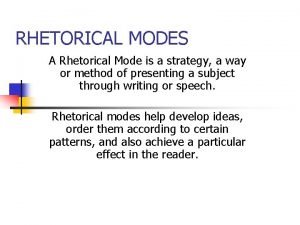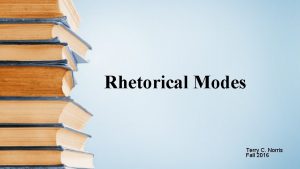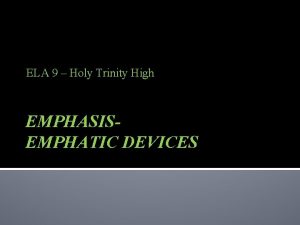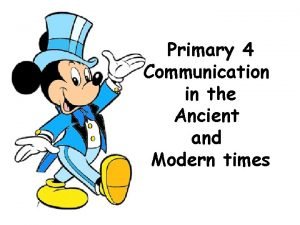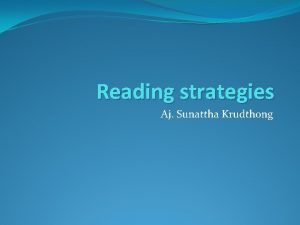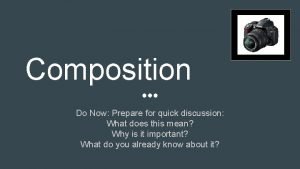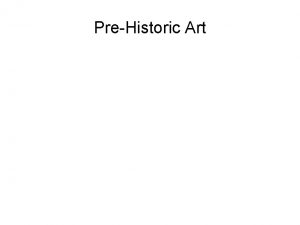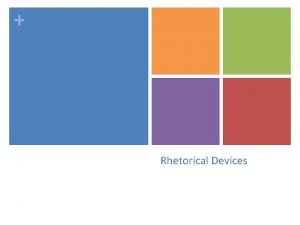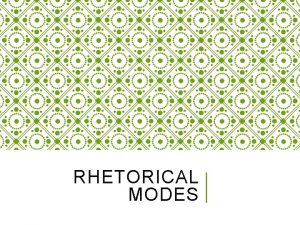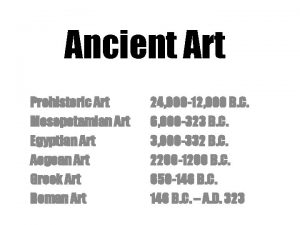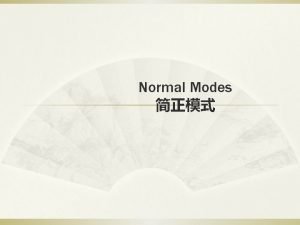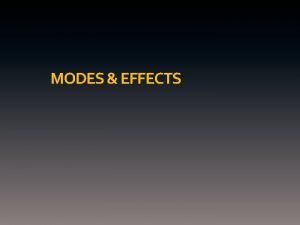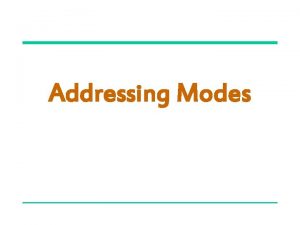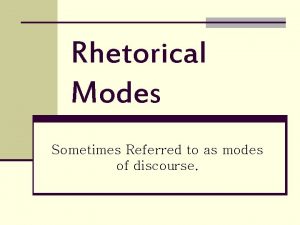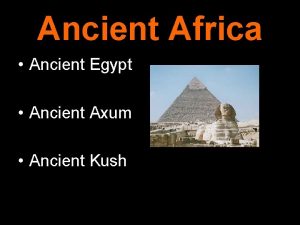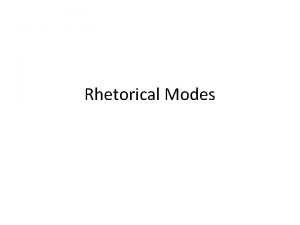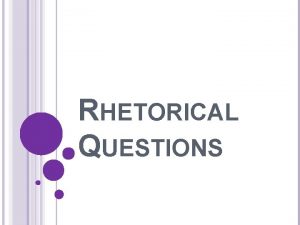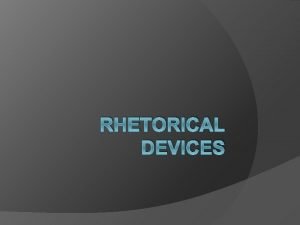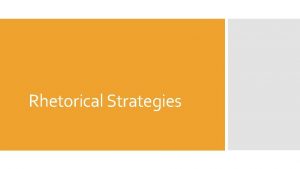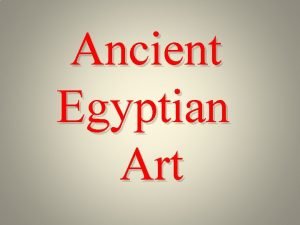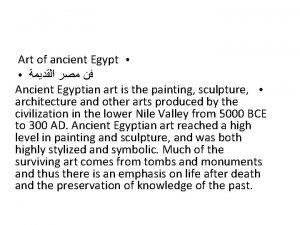Rhetorical Modes Rhetorical refers to the ancient art





























- Slides: 29

Rhetorical Modes Rhetorical refers to the ancient art of argumentation and discourse. Thus, rhetorical modes would be the techniques used to manipulate the language to effectively transmit the author’s message to a reader. Patterns. Mode may be defined as: a. A manner, way, or method of doing or acting: e. g. , modern modes of travel. b. A particular form, variety, or manner: a mode of expression.

Thus, rhetorical modes would be the techniques used to manipulate the language to effectively transmit the author’s message to a reader. Patterns.

Let the question decide the mode. For example: 1. Which is more important, college or university? - Use Comparison. 2. What happens when I don’t attend class regularly? - Use Cause/Effect.

How to decide which to use

Definition Uses • Helps you better understand your topic. • May suggest an organization for your essay. • Tells the reader exactly what you are talking about. Example • What is fast-food? A frozen dinner or a Big Mac?

Chronology Uses • Trace a topic’s development over time. • Could involve a cause-effect or problemsolving approach. Example • Trace the development of fast-food restaurants since 1950.

Description Uses • Adds concrete, physical details to an essay. • Must be organized systematically. • May be needed in Definition. Example • Describe a Big Mac.

Narration Uses • Introduce or reinforce your topic. • Illustrate a principle. • Clearly identify a problem. Example • Relate an occurrence at a fast-food restaurant that illustrates the dangers of food poisoning.

Process (“how to”) Uses • Focus on the steps needed to do something. Example • Describe the process for obtaining a burger from the time the customer places his/her order to the time they receive it.

Classification/Division Uses • Organize a large number of items into more manageable groups according to their relative similarities. • Break a subject down to better understand the whole. Example • Burgers: hamburgers, fish burgers, veggie burgers.

Cause-Effect Uses • Explain the cause(s) of a condition. • Explain the result(s) or effect(s) of a condition. Example • Show eating too much fast-food may cause obesity and other health-related conditions. • Show the causes of obesity related to the fastfood industry.

Question/Answer Uses • Introduce the topic of a paragraph or essay. • Engage the reader with a question that arouses their curiosity. Example • Ask the traditional questions: Who, What, When, Where, Why, How

Example/Illustration Uses • Support a point. • Clarify an idea. Example “Fast-food restaurants save time. ” Illustrate by showing the convenience of drivethroughs.

Problem-Solution Uses • Introduce a solution. • Could focus on both problem and solution. Example Problem - “Dubious nutritious value of fastfoods. ” Solution - Propose ways fast-foods could be made healthier.

Cost Benefit Uses • Analyse the pros and cons of a topic. • Weigh advantages and disadvantages. Example • Focus on individual, community, or global costs or benefits of fast-foods. • These could include financial, time, health, energy for example.

Analogy Uses • Compare two unlike objects to better understand one of them. Example • Compare fast-foods to the pace of contemporary society.

Compare/Contrast Uses • Show similarities and/or differences. Example • Compare some aspect of one fast-food restaurant to another.

Practice Below are 15 general topics. Using at least three different organizational modes (methods) per topic, write three different topic sentences for each topic.

Topics 1. 2. 3. 4. 5. 6. 7. 8. Alternative schooling Animal rights Eating disorders Email Evolution Exercise Gas prices Internet piracy

Topics continued 9. Global warming 10. Organ transplants 11. Privacy 12. Public speaking 13. Same-sex marriages 14. Sports violence 15. Stress

Examples using the topic “rap music” 1. Cause-Effect: Rap music, with its reliance on ever-changing slang, has expanded people’s vocabulary; for instance, one’s boyfriend is now called one’s “boo. ” 2. Definition: Rap music is defined by some as being no more than talking over someone else’s music.

3. Description or Narration: The lights were dim, and the crowd, writhing to the rhythm of the bass, was pressing forward to the stage. 4. Chronology: The style of rap music has evolved considerably since it first gained popularity with North American youth in the early 1990 s.

5. Question-Answer: How does rap music manage to offend a broad demographic group while maintaining a strong fan base? 6. Problem-Solution: It may seem somewhat ironic, but it is possible that many of the problems addressed in rap lyrics could be solved through this very same medium.

7. Compare (and Contrast): Rap and hip-hop music in the late 1980 s and early 1990 s, with their offensive lyrics and radical countercultural appeal, can be compared in terms of their sociological implications to the rock-and -roll revolution of the late 1960 s and early 1970 s. 8. Personal: When I first heard rap music I found the type of lyrics offensive and sexist.

9. Cause-Effect: Living in the ghetto, surrounded by “booty’ and the ‘brothers, ” can sometimes cause young men to chant words to a particular rhythm that has no melody. 10. Also: Rap music has been used as a vehicle for the oppressed minority to get its voice heard.

11. Process: To create rap music you need a DJ to provide the beats by mixing records and an MC who takes the beats and contributes the vocals to make the finished product. 12. Classification: There are many different forms of rap; these include hop-hop, hard core, and R&B.

13. Definition and Division: Rap is a unique form of music that is built around heavy bass beats mixed with sharp, quick lyrics. There is a whole spectrum of rap music, ranging from slow love ballads to fast-paced dance songs.

14. Cost-Benefit: Though rap may lead young people to openly and healthily question authority and the status quo, it can lead some adolescents to commit acts of violence against society. 14. Analogy: Rap can be compared to the insistent and repetitive chants of an evangelist preacher.

Credits Henderson, Eric. The Empowered Writer. Don Mills, Ontario: Oxford University Press, 2010. pp. 110 -120.
 Rhetorical mode description
Rhetorical mode description What does rhetorical mode mean
What does rhetorical mode mean Define rhetorical modes
Define rhetorical modes Rhetorical trinity
Rhetorical trinity Ancient and modern communication
Ancient and modern communication Ancient india vs ancient china
Ancient india vs ancient china Opera
Opera In a work of art the word composition refers to
In a work of art the word composition refers to Starry night harmony unity and variety
Starry night harmony unity and variety Ancient religious art
Ancient religious art Ancient art 30 000 b.c.–a.d. 400
Ancient art 30 000 b.c.–a.d. 400 000
000 Greek painting characteristics
Greek painting characteristics Enumeration rhetorical device
Enumeration rhetorical device Hình ảnh bộ gõ cơ thể búng tay
Hình ảnh bộ gõ cơ thể búng tay Ng-html
Ng-html Bổ thể
Bổ thể Tỉ lệ cơ thể trẻ em
Tỉ lệ cơ thể trẻ em Voi kéo gỗ như thế nào
Voi kéo gỗ như thế nào Tư thế worm breton là gì
Tư thế worm breton là gì Hát lên người ơi
Hát lên người ơi Môn thể thao bắt đầu bằng chữ f
Môn thể thao bắt đầu bằng chữ f Thế nào là hệ số cao nhất
Thế nào là hệ số cao nhất Các châu lục và đại dương trên thế giới
Các châu lục và đại dương trên thế giới Công thức tính độ biến thiên đông lượng
Công thức tính độ biến thiên đông lượng Trời xanh đây là của chúng ta thể thơ
Trời xanh đây là của chúng ta thể thơ Mật thư tọa độ 5x5
Mật thư tọa độ 5x5 101012 bằng
101012 bằng độ dài liên kết
độ dài liên kết Các châu lục và đại dương trên thế giới
Các châu lục và đại dương trên thế giới
